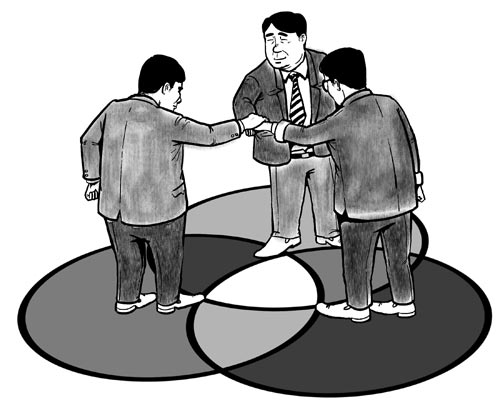
Chinese Premier Wen Jiabao said on Sunday that China, Japan and the Republic of Korea have agreed to launch talks on a free trade area this year. It is a significant step, which will both promote trade and advance friendly trilateral cooperation.
The study for an FTA between Japan and the ROK has been under way for 10 years, so one can imagine the difficulties involved in agreeing a trilateral FTA. In fact, only when an FTA between each pair of countries is created will it be possible to establish a trilateral FTA.
China and the ROK started their joint research on a bilateral FTA seven years ago, and have just announced that it has entered the negotiation stage. The slow process is due to the ROK's concerns about the impact Chinese agricultural products will impact on its market, while China has similar concerns about the ROK's heavy chemical industry. However, the growth in trade since the two countries established diplomatic relations twenty years ago indicates that the two economies are complementary.
 |
The trade volume between the two countries has grown from $5 billion in 1992 to $245.6 billion today and China is now the ROK's largest trading partner, while the ROK ranks as China's fourth-largest foreign investor. The ROK's Ministry of Strategy and Finance estimates that a free trade agreement between the two countries would help the ROK increase its real GDP by 0.95 percent to 1.25 percent within five years after the agreement became effective.
However, there will be a presidential election in the ROK in December, which may influence the negotiations for an FTA with China, so it may take two years or even longer for real progress to be made, which will delay developing their continuous economic cooperation.
The other factor that may influence a China-ROK FTA is the increasing economic cooperation between the Chinese mainland and Taiwan, as Taiwan has similar export strengths and product structure to the ROK. The Economic Cooperation Framework Agreement has already stimulated huge growth between the mainland and the island.
Studies on a China-Japan FTA have also been under way. China has been Japan's biggest trading partner since 2009, bilateral trade reached $344.9 billion in 2011 despite earthquake and tsunami. The direct investment from Japan to China has reached $73.26 billion, and China has invested $4 billion in Japan.
Some Japanese companies have been seeking to explore the mainland market by taking advantage of the Economic Cooperation Framework Agreement and investing in and cooperating with companies in Taiwan, such as Mitsubishi and Mitsui working with Uni-President Group, Marubeni Corp cooperating with Want Want China, and Itochu working with Ting Hsin International Group.
But the main reason Japan is accelerating negotiations for an FTA with China is because the studies show it would contribute 0.68 percent to Japan's GDP growth. According to the data of Nomura Securities, this would be higher than an FTA with any other country. For example if Japan established an FTA with the United States, it would only boost Japan's GDP by 0.35 percent. Therefore, it would be beneficial to Japan to agree an FTA with China as soon as possible. The research reports also indicated that an FTA between China, Japan and the ROK would boost Japan's GDP by 0.74 percent, much higher than the 0.54 percent offered by the Trans-Pacific Partnership.
FTA negotiations between Japan and the ROK started in 2003, but stopped as the ROK was dissatisfied with Japan's proposals for opening its agricultural products market and was concerned that it would increase its trade surplus with Japan. As territorial disputes have created misunderstandings, the negotiations have not restarted yet. However, since the China-Japan-ROK FTA is good for the ROK it will be positive about the negotiations this time.
But the negotiations need to proceed slowly, step by step, in order to ensure all sides reap the benefits brought by free trade.
The author is a research scholar with the Chinese Academy of International Trade and Economic Cooperation, affiliated to the Ministry of Commerce.